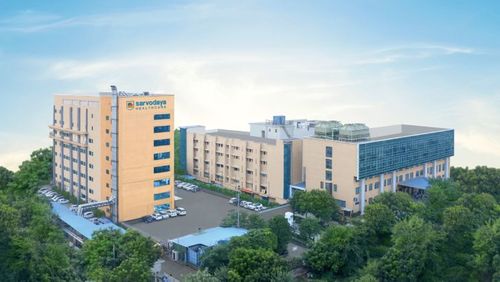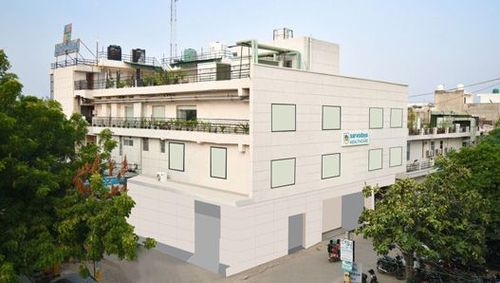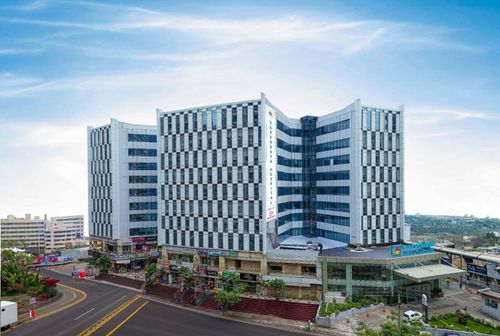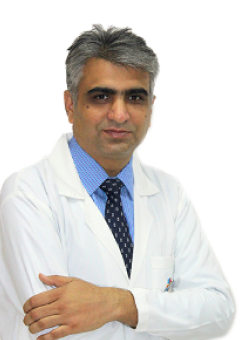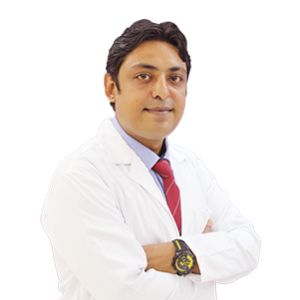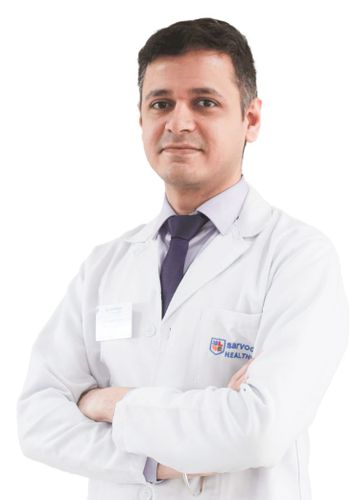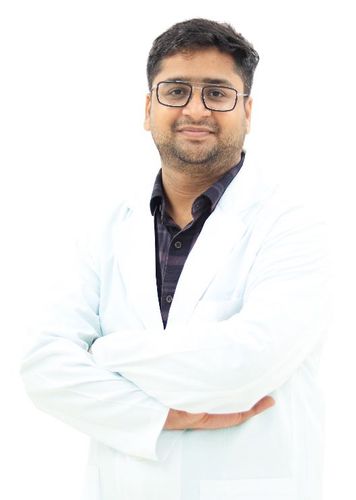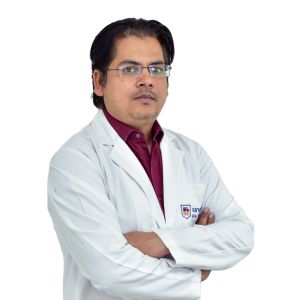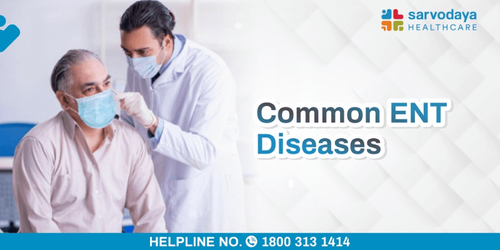Overview
Infections of the nose, throat, and ears are common conditions. While symptoms are typically mild, allergies and bacterial or viral infections can occasionally cause complications requiring ENT treatment. Sarvodaya's ENT Centre combines the finest ENT team with advanced audiometry technology to manage complex ear, nose throat diseases.
Our specialists begin by identifying the root cause of your problem, then focus on diagnosis and treatment while ensuring symptom relief for faster recovery and preventing recurring discomfort. We offer expertise in rhinoplasty, sialoendoscopy, advanced endoscopic sinus surgery, head and neck surgery, snoring and sleep apnoea treatment, swallowing disorders management, and speech therapy.
Symptoms of Ear, Nose & Throat Diseases
- Nasal congestion and facial pain (Sinusitis)
- Sore throat, fever, and difficulty swallowing (Tonsillitis)
- Ear pain, hearing loss, and fluid drainage (Ear Infections)
- Sneezing, runny nose, and itchy eyes (Allergic Rhinitis)
- Dizziness and unsteadiness (Vertigo and Balance Disorders)
- Hoarseness and persistent voice changes (Chronic Laryngitis)
- Disturbed sleep and poor rest quality
Cause of Ear, Nose & Throat Diseases
- Chronic infections and allergies
- Environmental irritants and pollutants
- Structural abnormalities in the ear, nose, or throat
- Viral and bacterial infections
- Age-related degeneration and hearing loss
- Lifestyle factors such as smoking and alcohol use
- Genetic predisposition and family history
- Occupational hazards and prolonged noise exposure
Diagnosis of Ear, Nose & Throat Diseases
Accurate diagnosis of ear, nose, and throat conditions helps identify the underlying cause, assess disease severity, and guide effective treatment, ensuring patients receive expert care from leading Best ENT Doctor in Delhi NCR.
- Clinical Assessment and Physical Examination – Detailed evaluation of medical history, symptoms, and risk factors followed by head, neck, ear, nose, and throat examination.
- Audiometry and Tympanometry – Hearing tests measure sound perception and eardrum movement to detect hearing loss, fluid buildup, or middle ear dysfunction.
- Nasal Endoscopy – A thin flexible scope visualises nasal passages, sinuses, and throat structures, identifying inflammation, polyps, or anatomical issues.
- Imaging Studies (CT, MRI, X-ray) – Advanced scans help detect sinus disease, structural abnormalities, tumours, and disease extent in complex cases.
- Allergy Testing – Pinpointing environmental and food triggers that contribute to nasal congestion, sinusitis, and recurrent throat infections.
- Throat culture and biopsy – Laboratory analysis confirms bacterial or fungal infections and rules out malignancy when needed.
- Sleep Studies – Overnight monitoring of breathing and oxygen levels to evaluate obstructive sleep apnea and related ENT conditions.
- Multidisciplinary Approach – ENT specialists collaborate with audiologists, allergists, and radiologists to ensure a personalised and comprehensive treatment plan.
Treatment of Ear, Nose & Throat Diseases
- Medical therapy – Antibiotics for bacterial infections, antihistamines and corticosteroids for allergies, decongestants for nasal congestion, and pain relievers for symptom control, tailored to individual patient needs.
- Surgical interventions – Functional endoscopic sinus surgery (FESS) for chronic sinusitis, tonsillectomy and adenoidectomy for recurrent throat infections, tympanoplasty for eardrum repair, mastoidectomy for chronic ear disease, septoplasty for deviated nasal septum, and turbinate reduction for nasal obstruction.
- Advanced procedures – Cochlear implants for severe hearing loss, balloon sinuplasty for minimally invasive sinus opening, and laser treatments for precise management of various ENT conditions.
- Reconstructive & cosmetic surgery – Expertly performed rhinoplasty, sialoendoscopy, and complex head & neck reconstructive procedures, enhancing both function and appearance at our leading Head & Neck Surgery Hospital in Delhi NCR.
Prevention & Lifestyle Modification
At Sarvodaya Hospital, we guide you with practical steps to manage and prevent complications from sleep apnoea, snoring, and speech or swallowing difficulties.
- Maintain a healthy weight and stay active – Weight control and regular exercise reduce airway obstruction and improve breathing during sleep.
- Adopt sleep-friendly habits – Sleep on your side, avoid late-night heavy meals, limit alcohol, and stop smoking to prevent snoring and apnoea episodes.
- Follow respiratory care advice – Use CPAP or other prescribed devices consistently for optimal airway support.
- Engage in speech and swallowing exercises – Regular practice of recommended exercises strengthens muscles, improves communication, and prevents aspiration risks.
- Family and lifestyle support – Involve caregivers, maintain routine practice, and avoid environmental triggers that worsen speech, swallowing, or breathing difficulties.
- Regular medical monitoring– Schedule check-ups at a trusted Speech Therapy Hospital in Faridabad for early intervention and ongoing support.
Pre–Post Treatment Care
Before treatment
- Complete medical history, including current medications, allergies, and previous ENT problems, to guide treatment planning
- Physical examination with specialised ENT instruments to assess the ears, nose, throat, and neck structures
- Diagnostic tests, including hearing evaluation, imaging studies, and laboratory work as indicated
- Patient education about the condition, treatment options, expected outcomes, and potential risks or complications
- Pre‑operative instructions for surgical cases, including fasting requirements and medication management
After treatment
- Regular follow‑up appointments to monitor healing progress and treatment effectiveness
- Medication adherence for prescribed antibiotics, pain relievers, or anti‑inflammatory drugs
- Activity restrictions as advised, particularly after surgical procedures, to ensure proper healing
- Signs and symptoms requiring immediate medical attention, including severe pain, fever, bleeding, or breathing difficulty
- Long‑term care planning, including hearing aid fittings, speech therapy referrals, or ongoing medical management.


